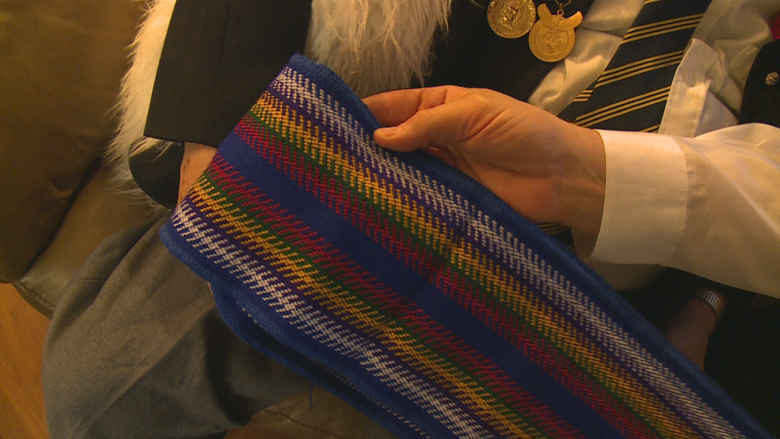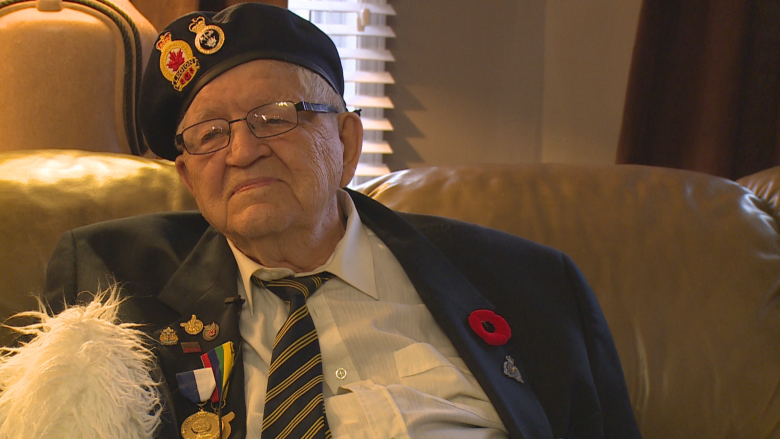Poppy a sign of friendship, says 91-year-old Métis WWII vet
Wilfred Rochon's face bursts in to a warm glow when he talks about leaving his small, northern Ontario town of Gogama to join the army during the Second World War.
Rochon laughs when he tells the story of enlisting in the army because it didn't go so well the first time he tried in 1944.
"When I was 17, they sent me to Toronto," said Rochon. "I knew the doctor there. He's a doctor from Gogama, and he sent me back home because I was too young."
That unlikely coincidence couldn't keep Rochon from his desire to serve.
"I figured they needed someone to go to war, you know, to help them out," said Rochon, who eventually made his way to Winnipeg — far from familiar doctors — and managed to sign up for basic training.
Prepare to invade
The young man from northern Ontario began preparing for an anticipated invasion of Japan. His training involved parachuting out of airplanes
"We had to be ready anytime, it didn't matter where we were," said Rochon, adding that never felt nervous of a possible deployment to the front lines.
"You don't think about that. You just keep tackling things day by day."
That call for deployment never came. The United States of America dropped the world's first atomic bomb over the Japanese city of Hiroshima, effectively ending the war.
With the front-line battle won, Rochon was transferred to Gravenhurst, Ontario to guard prisoners of war.
Always on guard
At this point Wilfred's son Jon Rochon takes over the story. His father's memory is starting to fade — and there are some stories he'd rather not tell.
But one story Jon's father did share provides a glimpse into service beyond the battlefront.
"There was a group of soldiers that he was guarding, some Germans and Italians that were officers" said Jon.
"They were called the 'Happy Gang.'"
Jon said his father bonded with the PoWs because they shared the same impulse to serve their country that had carried him across Canada to enlist.
"They were young guys and they went to war to fight for their country, just like my dad fought for his country," explained Jon.
But not all the PoWs were prepared to play cards with their captors.
"There's also a group of people that were still fanatical for their countries," said Jon. "It was like a war inside the Prisoner of War camp between themselves."
"The guards were like a referee of sorts, just holding them back against each other."
Métis roots
Rochon's story is part of a display honouring Métis veterans at the Chimczuk Museum in Windsor.
He was also one of the founding members of the Windsor-Essex-Kent Métis Council which he is still a member of today, along with his son.
Jon said it's a privilege to be able to hear stories from Indigenous veterans who can share first-hand accounts of what it was like to serve.
"I'm sure there's stories that were lost that we won't know about," said Jon.
"There's stories that you know can't come back. But I'm sure there's people that are still coming back with the stories and talking about our Indigenous past, our Native members of the community that did serve."
Strength of the poppy
The Rochon family has passed Wilfred's story down through three generations, with the veteran visiting his grand-daughter Sienna Rochon's school and answering questions ahead of Remembrance Day.
The eldest Rochon takes great pride in seeing the bright red poppy pinned to people we walks past.
"You know they're friends of yours," said Rochon, with a smile.
His son notices the respect whenever he walks with his veteran father.
"Even today we went to a store and just everywhere people, including the young generation, thank my dad for his service," said Jon.
"It's not forgotten."





